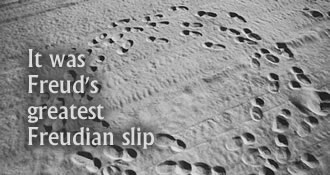
It was Freud's greatest Freudian slip, and for some reason his commentators, at least those I've read, haven't noticed it.
It appears in his last book, Moses and Monotheism, a strange work if ever there was one. It was published in 1939, by which time Freud had taken refuge in Britain. Had he stayed in Vienna, heaven knows what humiliations he would have suffered before being murdered along with his fellow Jews. For some reason, at this desperate time, Freud wrote a book (he originally described it as a 'historical novel') in which he tried to prove that Moses was an Egyptian. There have been many speculations as to why he wrote it, and I have no wish to add to their number. Early on in the book, though, there is a most curious episode.
Freud notes that several scholars have identified a common theme in stories about the childhood of heroes. The hero's birth is fraught with danger. As a baby, he is exposed to the elements in a way that would normally lead to death - sometimes by being placed in a box and thrown into the water. The child is rescued and brought up by adoptive parents. Eventually, he discovers his true identity. It is a story told about Sargon, Gilgamesh, Oedipus, Romulus and many others. It is also the story of Moses.
At this point, however, Freud notes that in one respect the story of Moses isn't like the others at all. In fact, it's the opposite. In the conventional story, the hero's adoptive parents are humble, ordinary people. Eventually he discovers that he is actually of royal blood, a prince. In the Moses story the reverse is the case. It is his adoptive family that is royal. He is brought up by the daughter of Pharaoh. His true identity, he discovers, is that he belongs, by birth, to a nation of slaves.
Freud saw this and then failed to see what it meant. Instead he changed tack and concluded that the story is a fabrication designed to conceal the fact that Moses was the son of Pharaoh's daughter; he really was a prince of Egypt. What Freud failed to realise is that the story of Moses is not a myth but an anti-myth. It takes a myth and turns it upside down.
Its message is simple and revolutionary. True royalty - the Bible suggests - is the opposite of our conventional wisdom. It isn't privilege and wealth, splendour and palaces. It's moral courage. Moses, in discovering that he is the child of slaves, finds greatness. It's not power that matters, but the fight for justice and freedom. Had Moses been an Egyptian prince, he would have been eminently forgettable. Only by being true to his people and to God did he become a hero.
Freud had mixed feelings about his own identity. He admired Jews but was tone-deaf to the music of Judaism. That is why, I suspect, he failed to see that he had come face to face with one of the most powerful moral truths the Bible ever taught. Those whom the world despises, God loves. A child of slaves can be greater than a prince. God's standards are not power and privilege. They are about recognising God's image in the weak, the powerless, the afflicted, the suffering, and fighting for their cause. What a message of courage Freud might have sent his people in that dark night! Let us at least see what he did not, that the story of Moses is one of the great narratives of hope in the literature of mankind.

